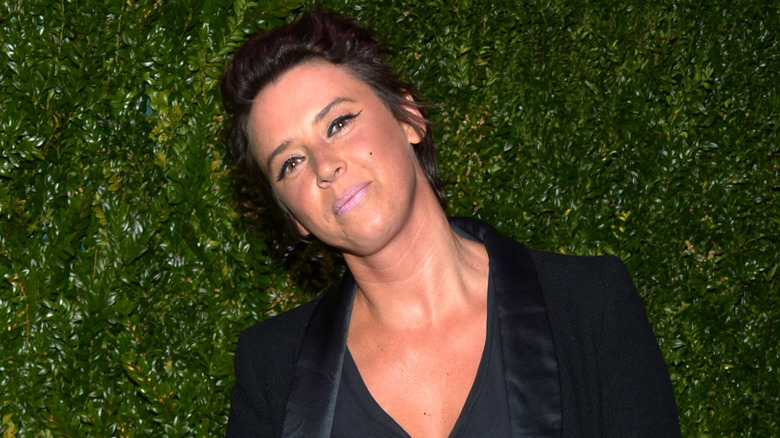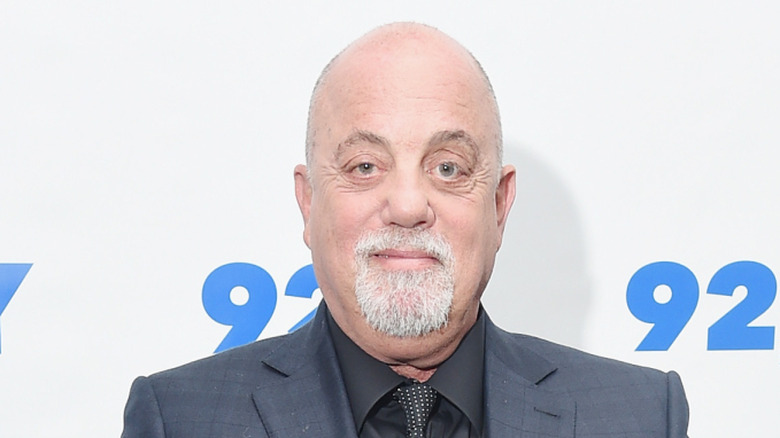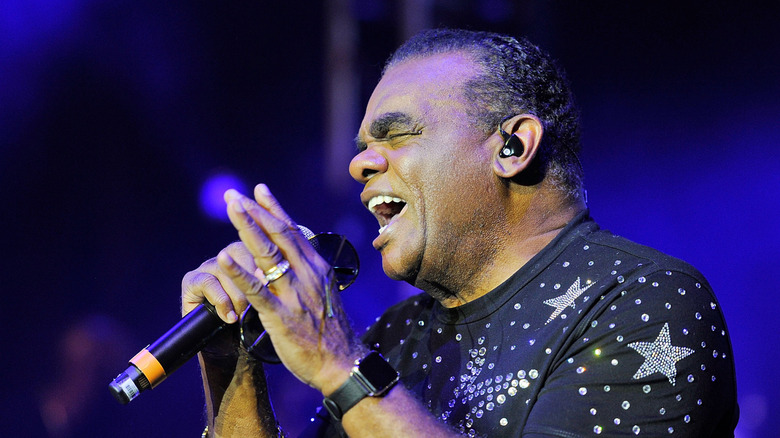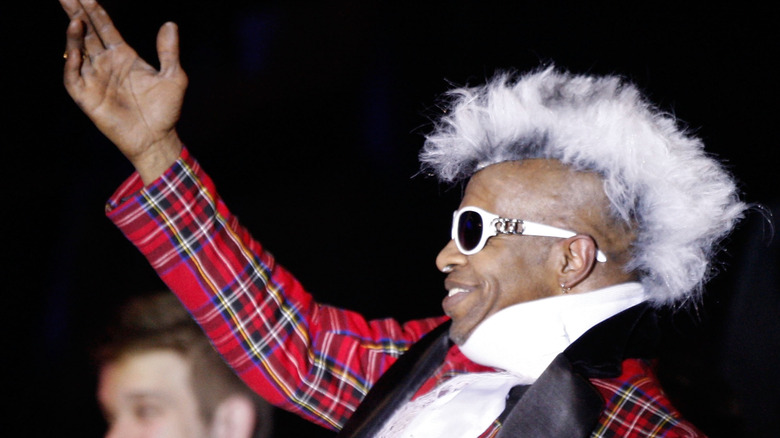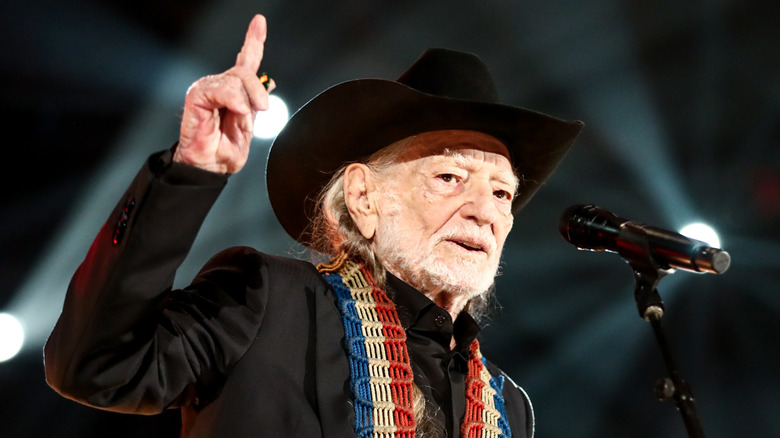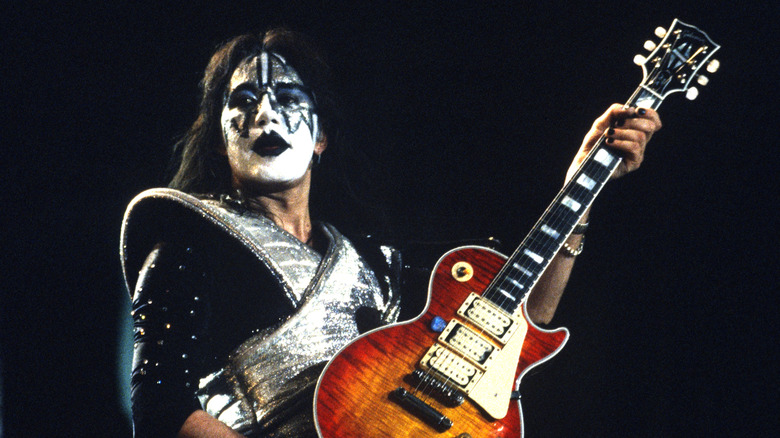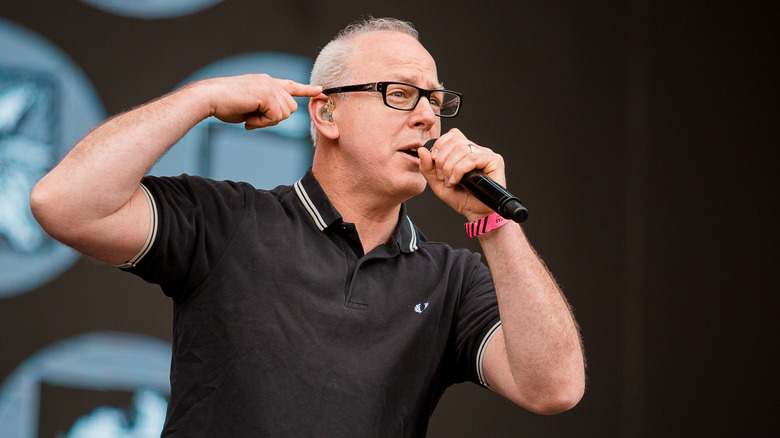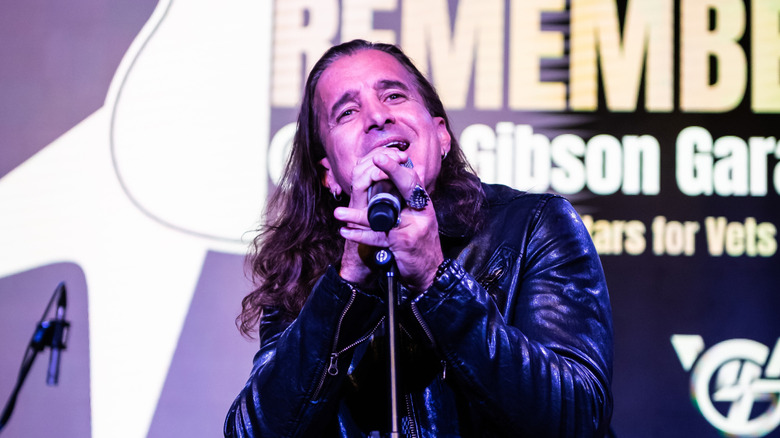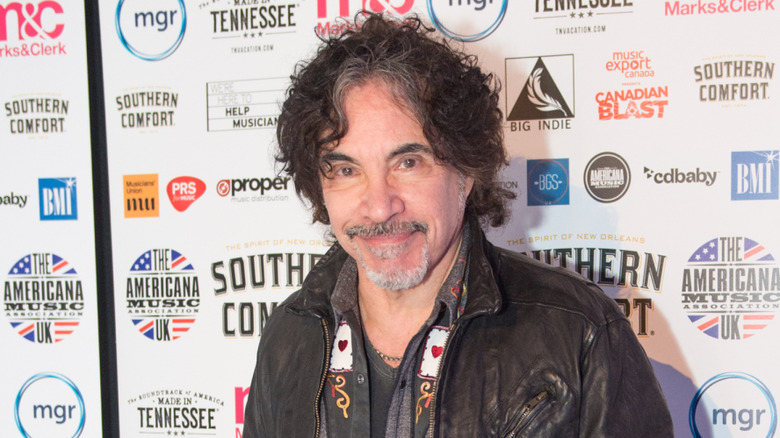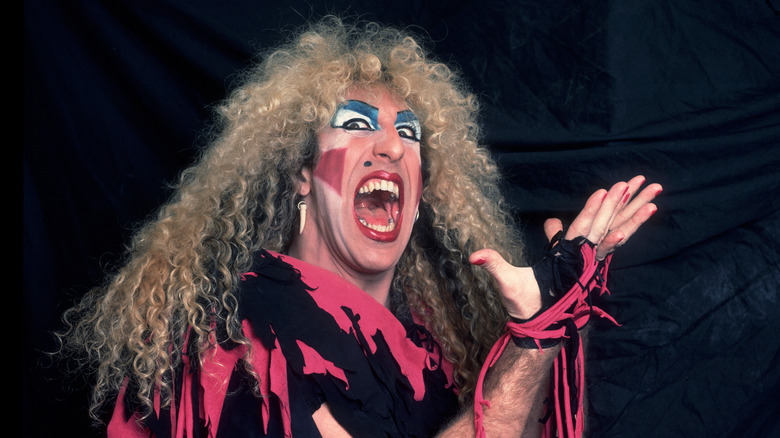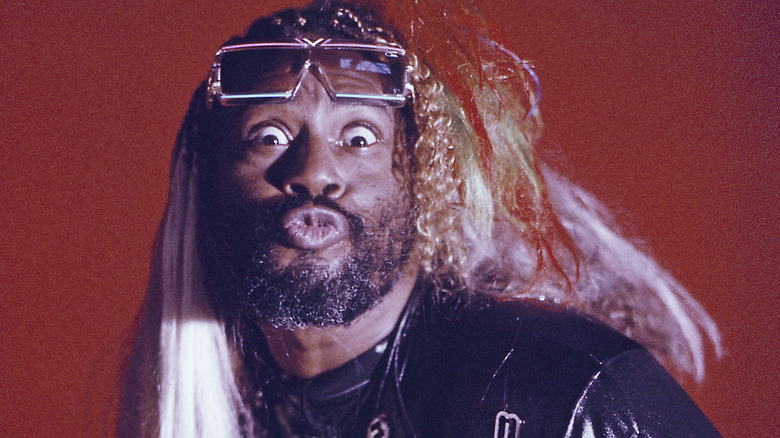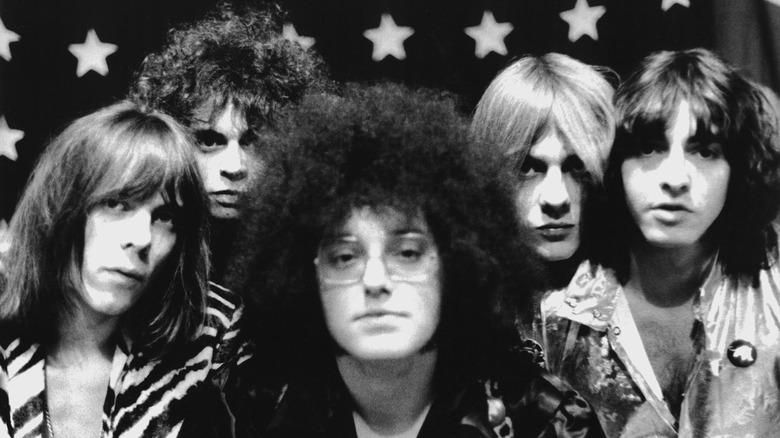Rock Stars Who Are Surprisingly Poor
It's easy to assume that every single rock star out there is rolling in cash. After all, we've heard them on Spotify, seen them rock out on stage night after night, witnessed them grace the covers of magazines, and seen them dominate online celebrity news. Someone that visible and audible just has to have a pretty sizable fortune, right?
Strangely, that's not always the case. While it's certainly true that many rock stars have earned hefty sums during their careers, they're also, well, rock stars. The rock 'n' roll lifestyle does not always breed paragons of financial responsibility, and the music industry itself is volatile enough that anyone who's not keeping tabs on their cash flow can easily find themselves repeatedly drawing the short straw in matters of money. As such, while some are not poor by ordinary standards, many of the world's most recognizable musicians have significantly less money in their bank accounts than you might expect. Let's take a look at rock stars who are surprisingly poor.
Cat Power
Chan Marshall, who you might know better as Cat Power, is one of the premier indie music success stories of the late 1990s and early 2000s. By the time 2012 rolled around, she was a revered artist who managed to sell out venues wherever she went, and even had a Top-10 Billboard album. That's the kind of career that not only makes people assume financial security, but to actually root for it. After all, isn't it nice that an indie musician can secure such a huge slice of the success pie?
Imagine everyone's surprise, then, when Power canceled her upcoming 2012 European tour due to the fact that she had gone bankrupt. To be fair, Power had some understandable reasons for her unfortunate financial situation, including a history of addiction and mental health issues. Some of those led to hospitalization, which necessitated wallet-hurting tour and show cancellations. In 2012, she had spent most of her savings on producing her hit album, "Sun," when she was struck down by angioedema, a potentially life-threatening immune disorder that swells up the face, tongue, and throat. Fortunately, she recovered, and seems to be doing a lot better in recent years, with new tours and albums coming through.
Billy Joel
Despite ending his monthly residency at Madison Square Garden in 2024, with scores of hit songs behind him, it's not like Billy Joel wallows in poverty. Still, even a wealthy entertainer feels it when someone embezzles him out of tens of millions of dollars. That was exactly what happened to Joel, courtesy of Frank Weber, his former manager.
The ridiculous numbers involved were revealed in 1989, when Joel sued Weber for a whopping $90 million, $30 million of which was compensation for money that Weber had allegedly squandered, and the remaining $60 million was punitive damages for the multiple ways the manager had reportedly defrauded the singer-songwriter. According to the lawsuit, Weber had given huge loans to his own enterprises in Joel's name, lost over $10 million on various investments, and even mortgaged the artist's copyrights without bothering to mention it — all the while pulling strings to make the papers Joel received massively misleading. Oh, and while he was doing all this, the former manager was happily raking in $20 million of the singer's money in commissions.
Joel's quest for comeuppance didn't exactly go well, as Weber cunningly filed for bankruptcy and the case was ultimately settled out of court. Oddly, this wasn't even the first time the Weber family had hurt the singer: In 1982, Billy Joel had a painful divorce from Frank Weber's sister Elizabeth, who ironically also used to manage Joel. "I hooked up with the Borgias!" the Piano Man would later exclaim to Fred Schruers, the author of "Billy Joel: The Definitive Biography" (via Page Six).
Ron Isley
It's probably fair to say that Ron Isley of the Isley Brothers (of "Twist and Shout" fame) isn't the greatest taxpayer on earth. The star was charged with five counts of tax evasion (and one "willful failure to file a tax return") in 2006, which netted him three years and one month behind bars, along with $3.1 million in back taxes. This was the last straw in a history of IRS troubles, to the point that the judge called him a "serial tax avoider" (via Billboard).
The singer's history with money — and the IRS in particular — is certainly less than exemplary. He first filed for bankruptcy in 1984. The second time came in 1997, when the IRS had enough with his antics and seized a bunch of his property, including cars and a yacht. In 2001, Isley was discharged from bankruptcy, but promptly failed to file his tax returns for those four years and cheated on his return for 2002. Fortunately, his 2006 prison sentence taught him his lesson and put him back on the straight and narrow ... that is, if one ignores that Isley was still fighting the IRS in 2013, and his earliest tax return troubles go all the way back to 1971. Hey, at least he's consistent.
Members of Grizzly Bear
Grizzly Bear broke through in 2006, and according to a 2012 interview with Vulture, they went from playing at diners for handfuls of people and "eating beef jerky from the gas station for protein" to opening for Radiohead, having their music featured in Super Bowl ads, and being praised by Jay-Z. Still, years of indie prestige, sold-out venues, and critical acclaim didn't make the band super-rich. In fact, according to singer Ed Droste, they didn't make it close to any kind of wealth at all.
At the time of their 2012 interview, the band members still lived in the same places they did pre-fame, and some of them didn't even have health insurance. While Droste admitted they're getting by, he said that the fact that no one's buying records anymore makes "bands appear so much bigger than they are," and noted that even the seemingly lucrative act of licensing a song (for advertisements and suchlike) only brought the band members financial security at a "Yay, I don't have to pay rent for two months" level.
Grizzly Bear generated most of their revenue by touring, but after agents, managers, tour staff, venues, and others have taken their share, the band members' bank accounts are apparently nothing to write songs about. To make things easier on their wallet, they managed to cut costs by only sleeping in hotels occasionally and generally treating the whole operation as a "risky small business." While the band has not officially split up as of late 2024, they haven't done much since 2019, although rumors of a reunion have swirled around.
Sly Stone
You probably know several Sly & the Family Stone songs, even if you don't necessarily know their singer. Sly Stone and his group were a mainstay of the late 1960s and early 1970s music scene, and songs like "Dance to the Music" and "Everyday People" remain pop culture benchmarks. As the front man and primary songwriter of the group, it's easy to think that Stone would be rolling in the same kind of cash many other superstars of the era do. Instead, in 2011, he was rolling in a camper van that he also lived in.
It appears that around 2007, Stone was still indeed living the kind of life you'd expect from a star of his caliber, with a huge house, a vineyard in Napa Valley, and multiple cars. However, it appears that the combination of hefty drug misuse issues and some financial difficulties, including a $50 million lawsuit against his former manager, eventually left him in a bad place. While Stone himself claimed to quite enjoy the transient van life, his situation was reportedly less than idyllic. Luckily, Stone's finances have somewhat improved from those days thanks to the Music Modernization Act, which dragged copyright law kicking and screaming to the modern age — and in the process netted Stone some no doubt welcome streaming royalties.
Willie Nelson
Despite being one of country music's biggest and longest-tenured artists, Willie Nelson has surprisingly little to show for himself. To be fair, he is still a millionaire, but compared to the hundreds of millions — or even billions — enjoyed by the richest artists, Nelson's relatively humble estimated wealth of $25 million is still a little surprising for such an established name.
A lot of Nelson's difficulties stem from his issues with the IRS, which once hit him with a ridiculous $16.6 million bill, and while Nelson's lawyer negotiated it down to a "mere" $6 million, it didn't make the sum any more affordable for the artist. Things eventually escalated to a point where the IRS confiscated basically everything Nelson owned in 1990, and the poor country star had to spend years in a tax-debt limbo. At one point, Nelson even released an album called "Who'll Buy My Memories? The IRS Tapes" in an effort to raise money to pay the Man.
To be fair, Nelson's finances were somewhat rocky even without the IRS, as the country legend had a habit of keeping a huge entourage and distributing his cash readily to hangers-on, sometimes to the point where he himself had little left.
The Verve
Fronted by Richard Ashcroft, British rock band The Verve broke through in 1997 with their hit single "Bitter Sweet Symphony." The song utilized a brief snippet from an orchestral rendition of The Rolling Stones' "The Last Time," which was taken from the 1965 oddity "The Rolling Stones Songbook," an album full of easy-listening versions of Stones songs that was the brainchild of the band's then-manager, Andrew Loog Oldham.
While it wasn't the band's only hit, it was their biggest. When "Bitter Sweet Symphony" rocketed up the charts, Ashcroft heard from Alan Klein, the Stones' fearsome one-time manager, who still held the rights to the band's early songs — including "The Last Time." Klein demanded 100% of the royalties; facing an expensive, uphill legal battle, the band felt there was no choice but to cave in, and Ashcroft was paid a mere $1,000. After Klein's 2009 death, his son took over ABKCO, the company that held the copyright for that song. "I'm coming for that money," Ashcroft said in a 2018 interview with Consequence of Sound's "Kyle Meredith With ..." podcast. "Someone stole god knows how many million dollars off me in 1997, and they've still got it."
In 2019, more than 20 years after the song's release, Ashcroft took to social media to reveal that Richards and Jagger had made the "magnanimous gesture" of signing over their songwriting credits to him. Billboard estimated that Klein's shenanigans cost Ashcroft somewhere in the range of $5 million in royalties.
Norman Greenbaum
There are few rockers more emblematic of the one-hit-wonder phenomenon than Norman Greenbaum, whose 1969 hit "Spirit in the Sky" represented the zenith of his career. While he was hopeful of building upon that initial blush of success, no further hits followed. As the years passed, he struggled to maintain a career in the music biz. By 1980, he'd thrown in the towel completely, giving up music to work as a restaurant cook. "I was broke, what else could I do?" he recalled in a 2006 interview with The New York Times.
Everything changed in 1987, when the song was licensed to appear in the movie "Maid to Order." Then, the song was front and center in the Tom Hanks-starring "Apollo 13," which led to "Spirit in the Sky" being utilized in dozens of films, TV shows, and commercial spots over the years. The royalty checks began pouring in, and Greenbaum was able to quit his job. "Well, it's not like it's made me rich, as you can see," he said, gesturing to the two-bedroom apartment he called home. "But because of 'Spirit in the Sky,' I don't have to work. So in that sense, it's a comfortable living."
As Greenbaum told Rolling Stone in 2020, he still enjoys hearing his song perk up a movie. "I'm blown away by the whole thing, really," he said. "Not because I know I'm going to make some money out of it. It's something as a performer you appreciate very much."
Ryan Adams
After exiting alt-country band Whiskeytown, Ryan Adams went solo with the critically acclaimed debut album "Heartbreaker." His success as a singer-songwriter grew, as did his fame, particularly when he married singer/actor Mandy Moore. A few years after he and Moore divorced, a 2019 exposé in The New York Times presented the stories of seven women — one of who was Moore — who characterized him as psychologically abusive. After that, Adams' once-promising career cratered.
By 2021, his career had slowed down so much that he issued an Instagram post (which he later deleted) begging for a record deal. "I know I'm damaged goods," he wrote, as reported by NME. "I'm months from losing my label, studio and my home/ I just really want a second chance to make some music ..." Continuing, Adams indicated that his financial situation had grown dire. "I'm 46 and scared I'm gonna be living in my sister's basement," he added. "If you are a label and interested please let me know." Shortly afterward, he admitted his fears to Los Angeles Magazine. "So I'm losing my life's work, and my dream of who I am, my ability to provide for myself," he said, admitting he'd contemplated selling his publishing so he wouldn't lose his rented home.
In 2024, Adams re-emerged with several new albums. He also embarked on a solo concert tour, attempting a comeback to regain the career he'd lost.
Mick Taylor
Mick Taylor was already a blues guitar wunderkind when he joined legendary rock group The Rolling Stones at age 20. Taking over lead guitar duties in 1969 after the firing and almost-immediate tragic death of Brian Jones, Taylor went on to appear in what are considered to be the band's best albums: "Let It Bleed," "Sticky Fingers," and "Exile on Main Street." He quit the Stones abruptly in 1974.
As a solo artist, Taylor never came close to matching the level of success he'd experienced with the Stones. In 2009, he gave an interview to the Daily Mail, griping about not being given songwriting credit for tracks in which he believed he'd made essential contributions. "Mick [Jagger] had promised to give me some credit for some of the songs — and he didn't," said Taylor, who claimed he hadn't received any money from the Stones since 1982; he was apparently living in a shabby home, and couldn't pay his bills.
However, Taylor's manager, Jeff Allen, Allen told NME that he'd experienced "shock, horror and disbelief" by the way the guitarist was falsely characterized. "The emphasis of the article was that Mick was some kind of run-down, down-and-out tramp living in Suffolk," he said, explaining that Taylor's home was in the midst of a reno. While details of Taylor's financial situation haven't been made public, it's a safe bet that he's not nearly as well off as Mick Jagger and Keith Richards, each of whom are reportedly worth hundreds of millions of dollars.
Ace Frehley
As part of the original lineup of KISS, Ace Frehley was a founding member of the fire-breathing, face-painted foursome. Instrumental in the band's initial success, Frehley played guitar for KISS from 1973 until quitting in the early 1980s to pursue a solo career. Although his split from the band was fractious, he and bandmates Gene Simmons and Paul Stanley buried the hatchet and rejoined in 1996 for a reunion tour with the original lineup, including drummer Peter Criss. Frehley remained in KISS until parting ways in 2001, although he continued to perform with the band sporadically after that.
The years that followed were rough ones for Frehley. His solo work never came close to generating the same sort of success he'd achieved with KISS, and he experienced some severe money problems. In 2013, a report in the Journal News (via the Daily Mail) claimed that Frehley was losing his home to foreclosure, and hadn't made a mortgage payment in two years. In addition, he also owed close to $20,000 in unpaid taxes.
Looking back at his exit from KISS, Frehley wished he'd done things differently, and not quit the band that first time. "It was a stupid decision when I look back now cause I lost millions of dollars," Frehley admitted while appearing on the "Talk is Chris Jericho" podcast, as reported by Loudwire.
Glen Matlock
Bass player Glen Matlock was a founding member of the Sex Pistols. While he was there at the beginning, he didn't experience the band's greatest success and eventual flameout, due to being replaced in 1977 by doomed punk icon Sid Vicious. Interviewed by The Telegraph in 2014, Matlock observed that his exit from the Pistols came at a considerable cost to his finances. "Somewhere in the low millions," he estimated.
While he received songwriting royalties for his work on the band's debut album, "Never Mind the Bollocks," that income did not go unnoticed by the tax authorities. "In 1983 the taxman came knocking for £35,000 to £40,000, which I didn't have," he said. "I had to remortgage my flat in the end." Looking back, Matlock regretted the decision to pay off his taxes in full, rather than waiting until he'd been able to amass some more money. "Then I wouldn't have had a massive mortgage on my shoulders at punitive interest rates when I wasn't working," he explained. At the time, he revealed what he hoped to achieve over the course of the next five to 10 years. "To pay off my mortgage," he said.
These days, Matlock remains a working musician. He joined Blondie in 2022, and since then has accompanied the band on tour.
Cass McCombs
Cass McCombs may not be a household name, but he's certainly well-known in indie rock circles. Since first making waves in the early 2000s, the singer-songwriter has released numerous albums, collaborated with the likes of DJ Khaled, and toured with bands such as The War on Drugs and Arcade Fire. His producer, Rob Schnapf, has worked with such artists as Elliot Smith and Beck.
Despite all that, McCombs is hardly living the kind of lifestyle one might associate with a rock star. "I don't really understand how any musician can afford to stay in one place. We don't make enough money to afford an apartment," he revealed in a candid interview with Vulture.
In the modern era of music streaming, when artists such as McCombs earn a fraction of a penny per stream, money isn't exactly pouring in. "I know pretty much half of the musicians in existence have a side job of some sort," he added, admitting he was certainly not immune from that phenomenon. "I've done everything," he explained. "Worked in horse stables, rode a truck. Worked at bookstores, record stores, movie theaters. I was a projectionist. Worked in delicatessens. Did demolitions. Painting. I painted the Trump Tower one time. Folded and licked invitation envelopes."
Greg Graffin
Greg Graffin is legendary to punk fans as the front man of Bad Religion since its founding in the 1980s. He is also an evolutionary biologist with a Ph.D. from Cornell University. He's since gone on to juggle his role as punk icon with his other job as a professor at UCLA.
Thanks to his day job and the enduring popularity of Bad Religion, Graffin lives comfortably, albeit hardly lavishly. "I never purchased fancy sports cars, and so instead you go and you buy a house a little earlier than your peers," Graffin told Marketplace of the financial philosophy that's guided him throughout the years. "I was, I would say, somewhere between a well-paid professor and a university president in my values."
As Graffin mused in a "Punk Manifesto" posted on the Punx in Solidarity website, he's done reasonably well in the money department, albeit certainly not as well as people might assume. "Although I have made money from Punk, it is a modest amount when one considers the bounty that has been bestowed on the companies that promote Punk as some sort of a product to be ingested," he wrote.
Mel B
For anyone on the outside looking in, Mel B seemingly had it all. The erstwhile Scary Spice had parlayed her Spice Girls fame into TV celebrity, both in her native U.K. and in the U.S., the latter perhaps being most notably as a judge on "America's Got Talent." She also reaped the financial windfall of the Spice Girls' 2019 reunion tour.
However, as she revealed in a 2024 interview with BBC, her divorce from her allegedly abusive ex-husband Stephen Belafonte had left her flat broke. All the money she made from that tour, she said, went to pay her ex, to whom she owed a $350,000 settlement, in addition to $5,000 each month in child support. "I wasn't just emotionally and physically abused, there was all the financial abuse too," she explained. "I didn't realize that I didn't have as much money as I thought I had. So I literally had to eat humble pie, live with my mum."
In addition to moving in with her mother, she was also forced into a lifestyle adjustment, one that required her to cut her spending significantly so she could save up enough money to move out and eventually get her own place. "But I just put my head down, worked and lived frugally and hence I've been able to buy my own house," she shared.
Scott Stapp
Following the release of the band's 1997 debut album "My Own Prison," Creed racked up a string of hits such as "With Arms Wide Open," "My Sacrifice," and "One Last Breath." By 2004, however, the band's popularity had waned, while tensions between frontman Scott Stapp and his bandmates led Creed to split up in 2004.
Stapp pursued a career as a solo artist, but success didn't follow. In 2014, Stapp shared a video on social media detailing just how far he'd fallen. "Right now, I'm living in a Holiday Inn, by the grace of God, because there's been a couple of weeks where I had to live in my truck," he said, as reported by the Tampa Bay Times. "I had no money, not even for gas or food." According to Stapp, his plight was due to unpaid royalties and the IRS freezing his bank accounts. Shortly after, reached out to fans to crowdsource funding so he could record a new album.
In the decade since then, however, Stapp's fortunes rose substantially after hatchets were buried and he reunited with Creed for a massively successful 2024 reunion tour. That same year, "Creed's Greatest Hits" cracked the Top 40 in Billboard's album charts. Then, in early 2025, "One Last Breath" hit the No. 1 spot in Billboard's Hard Rock Streaming Songs chart. "It's a pretty unbelievable comeback, as comebacks go," Ken Fermaglich, the band's agent, told Billboard of the sold-out tour.
Tommy James
During the latter half of the 1960s, Tommy James & the Shondells landed numerous singles on the charts, including such classics as "Crimson & Clover" and "I Think We're Alone Now." In 1968, he sold more albums in the U.S. than The Beatles, but the 1970s saw the hits become smaller and less frequent, partly due to a heroin addiction that James would eventually overcome.
However, much like the basketball stars who are surprisingly poor, all that early success did not leave him with the kind of hefty nest egg one would assume. That was because of the contract he'd signed at age 19 with Roulette Records, owned by mob-linked Morris Levy. Interviewed by The Guardian, James revealed that Levy had bilked him out of a fortune. "Somewhere in the ballpark of $30 million to $40 million in royalties," he estimated. As for why he didn't pursue what was rightfully his, James pointed out that Levy was a fearsome figure with a reputation for violence. "You took your life into [your] hands when you asked Morris for royalties," James told Classic Rock.
These days, James supports himself by touring with the Shondells, and also has a show on SiriusXM's '60s Gold channel. In 2024, he married his longtime manager, Carol Ross, after both had lost their respective spouses. As of June 2025, his tour dates extended well into 2026.
John Oates
Hall & Oates carved out a niche in pop music during the '70s and '80s, tailoring their sound to fit evolving musical trends — evident in tracks ranging from 1976's "Rich Girl" to 1982's "Maneater." With six No. 1 hits under their belts, Oates had been living large, indulging in a luxurious lifestyle befitting the rock star that he was. That, however, came at a high cost; in 1987, his accountant revealed that he'd burned through all the money he'd made and was down to his last $50.
"I just wish they'd warned us that the highlife we were living would have financial consequences," Oates wrote in his memoir, "Change of Seasons," referring to his ex-manager Tommy Mottola and lawyer Allen Grubman. While Oates stopped short of accusing the two of ripping him off, he did blame them for his financial predicament. "We weren't cheated; we were seduced," he explained.
Oates later regained financial stability after he and Hall were paid royalties owed to them. Subsequently, he attempted to sell his share in Hall & Oates' publishing, but that was kiboshed by Hall, who claimed that Oates had executed the sale clandestinely and without his approval. As a result, lawsuits began flying between the two. The duo rancorously ended what had been a successful musical partnership in 2024. There was, Hall told Billboard, zero chance of a reunion. "That ship has gone to the bottom of the ocean," he said.
Dee Snider
With a heavy metal sound and a glam-rock look, Twisted Sister hit it big with the 1984 teen-rebellion anthem "We're Not Gonna Take It." In a similar manner to the numerous wrestling stars who are surprisingly poor, the band's success may have brought fame to frontman Dee Snider, but fortune was another matter entirely. As he told Ultimate Classic Rock, "... we had not gotten one royalty check." The band split up in 1988, and by 1995, Snider was reduced to clipping coupons and shopping in thrift stores to survive.
"It was crazy how broke we were," he recalled in a 2012 interview with Fox News. He ultimately declared bankruptcy, and not just once. "Double bankruptcy, my career collapsed," he subsequently told Fox News. "I was riding a bicycle to a desk job, answering phones ... things just went incredibly south." When Snider reunited with the band in 1997, their label erased the band's debt, and money finally began flowing in. His financial status continued to rebound as the band's music began being used in film, TV, and advertising, as well as in the hit Broadway musical "Rock of Ages" (Snider even starred in the show for an 11-week run).
More success came when a Christmas song he'd written years earlier, "These Are Special Times," was recorded by Céline Dion for a hit holiday album. In 2015, Snider sold his publishing catalog. As Snider told Sirius XM's Eddie Trunk (via Blabbermouth), he was paid "a lot of money."
George Clinton
As the musical mastermind behind Parliament-Funkadelic, George Clinton took funk music in bold new directions, infusing elements ranging from hard rock to psychedelia. While the group was wildly popular and heavily influential, Clinton also lost a ton of money. He eventually wound up going bankrupt, but later claimed that he hadn't been behind it and that his signature on the bankruptcy filing had been forged. "That's not my social security number, not my info at all," Clinton told The Observer of his "fictitious bankruptcy."
However, over the years, Clinton has continually complained that he'd been ripped off by his former business partner, music exec Armen Boladian. Indeed, Clinton and Boladian have been duking it out in court for more than four decades. When Clinton accused Boladian of robbing him in his memoir, Boladian sued for defamation; that suit, however, was defeated when a jury determined Clinton's statements did not constitute defamation.
In March 2025, Clinton launched a lawsuit against Boladian. In the suit, Clinton accused Boladian of fraud, copyright infringement, and withholding millions of dollars in unpaid royalties. The suit (via USA Today) contends that Boladian defrauded Clinton by "adding fictitious songwriters to dilute Clinton's share in songwriters royalties," while also convincing Clinton to write his signature on blank contracts. The end result, Clinton alleged, was that Boladian had been "collecting royalties from Clinton's catalog while fraudulently denying Clinton tens of millions of dollars."
Goo Goo Dolls
Best known for the single "Iris," the Goo Goo Dolls experienced rock stardom, but never made the kind of money most people would associate with that level of success in the music industry. That was due to a draconian record deal the band signed; while its 1995 breakthrough album, "A Boy Named Goo," sold 2 million copies, the band members were shut out of royalties by its label, Metal Blade, and kept in the dark about any that might be due. What the Goo Goo Dolls did to avoid going broke was to go to court; after a months-long legal battle, the band was freed from its repressive contract, and landed a new (and much better) deal with Warner Bros.
With record sales suffering in the era of streaming, the Goo Goo Dolls now rely on live performances to get by. According to frontman Johnny Rzeznik, he and the other members certainly aren't destitute, but neither are they living in lavish luxury. "Nobody makes any money out of selling records anymore because nobody buys records anymore. You make crap for streaming. People stream your songs and you make no money", he told Noise 11 in 2024. "I don't have a Ferrari. I have a platinum record Ford Bronco and from my Spotify billion streams [I] have a Matchbox car of the Bronco I drive around," he added. "That's my life."
Pete Doherty
Pete Doherty has always been bigger in his native U.K. than in the U.S., known for his work with The Libertines, Babyshambles, and as a solo artist. While his music career has been a successful one, it's also been tainted by heavy drug misuse early in his career, and he's become something of a cautionary tale. Back in 2012, reports emerged that despite the millions he'd earned, he was teetering on the brink of bankruptcy, while a recent tour had actually lost money.
A decade later, however, he'd cleaned up his act and his finances. By 2023, Doherty was reportedly worth well over $1 million. In an interview with The Times, Doherty admitted that he hadn't made the best financial decisions when he was mired in drug addiction, which explained how Doherty lost all his money. "Even when we were having No. 1 albums and I was making good money, I never saved or invested," he said. "The more money I made, the more I spent. Unfortunately I am now paying the price for that — still trying to sort out tax bills from 10 years ago. You've got to remember that when you're in the depths of an addiction you don't make the smartest choices."
MC5
Born in Detroit in the late 1960s, MC5 went on to become one of the most influential proto-punk bands ever; its 1969 debut album, "Kick Out the Jams," is now considered to be a classic. That said, the recognition the band received came years later, and MC5 never made a noticeable commercial dent. Their next two albums were also commercial flops, and the band's label, Atlantic, canceled its contract in 1971. A relocation to England did little to change MC5's fortunes, exacerbated when some members of the band began dabbling in drugs. When what money they had finally ran out, MC5 filed for bankruptcy.
Just a few years later, guitarist and lead singer Wayne Kramer was in a Kentucky prison, serving time on drug-related charges. That was when he read an article in Billboard about the burgeoning punk movement, declaring that the bands at the forefront of punk had been heavily inspired by MC5. He bitterly tore up the magazine and flushed it down his cell's toilet. After his release, Kramer spent most of the 1980s as a carpenter, only playing music sporadically.
Guitarist Fred "Sonic" Smith went on to marry punk poet Patti Smith, with the couple settling in suburban Detroit and raising a family until his 1994 death. Bassist Rob Tyner quit the music business after the band broke up and died in 1991, at age 46. Drummer Dennis Thompson died in 2024 at age 75, in a nursing home while recovering from a heart attack.
If you or anyone you know needs help with addiction issues, is dealing with domestic abuse, or needs help with mental health issues, contact the relevant resources below:
-
The Substance Abuse and Mental Health Services Administration website or contact SAMHSA's National Helpline at 1-800-662-HELP (4357).
-
The National Domestic Violence Hotline at 1−800−799−7233. You can also find more information, resources, and support at their website.
-
The Crisis Text Line by texting HOME to 741741, call the National Alliance on Mental Illness helpline at 1-800-950-NAMI (6264), or visit the National Institute of Mental Health website.

